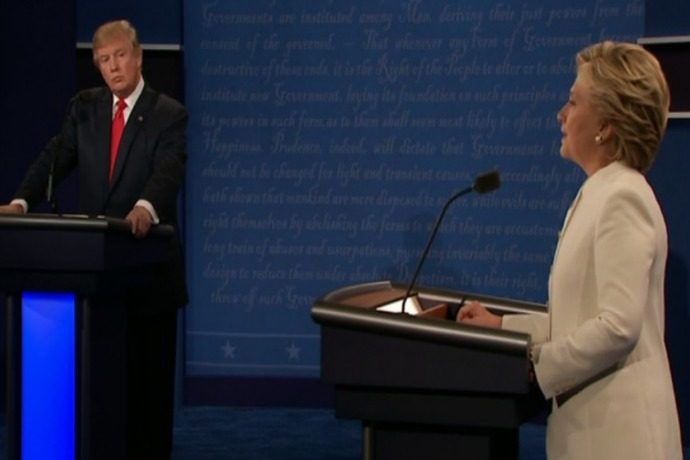I really thought I’d feel better once the debates were over. I’d been looking forward to today as the beginning of the end of this interminable campaign—the moment when the light at the end of the tunnel came into view. In an election that’s seen sexual assault allegations, endorsements from white supremacists, and infiltration by Russian hackers take center stage, it’s no wonder that the most common comments I hear are variations on the same theme: are we there yet? And with less than three weeks to go until election day, the end is in sight. But the antics of the Republican nominee have been more of the center ring variety—and the circus isn’t over quite yet.
The debates feel like they should be important, but it’s hard to invest in them when one candidate resorts to name calling and literal stalking, while the other is never forced to truly respond to valid criticisms because her opponent is an abysmal debater. Rather than relief, I find myself afraid. What does American democracy look like on the other side of this election? It seems clear, at least, that our Trump hangover will be with us long beyond November. Trump has virtually no chance of winning, but after months of decrying “the media” and “the system” as rigged, he used the final debate as an opportunity to announce that he’ll have to decide, when the time comes, whether or not he’ll honor the results of the election.
Let that sink in. Now remember that it’s not just Trump. The Associated Press report from the debate notes that:
Trump’s assertions raise the prospect that millions of his supporters may not accept the results on Nov. 8 if he loses, thrusting the nation into uncharted territory. Free and fair elections, with the vanquished peacefully stepping aside for the victor, have been the underpinning of America’s democratic tradition since the country’s founding 240 years ago.
The Republican National Committee immediately disavowed Trump’s statement. There is no evidence of widespread voter fraud, and election officials across the country have denied and denounced Trump’s charges.
And Trump supporters have already heard for months that they must “watch the polls” to keep the election from being “stolen.” So even if Trump himself stands down, there’s a chance that they will not.
‘I’ll look for . . . well, it’s called racial profiling. Mexicans. Syrians. People who can’t speak American,’ he said. ‘I’m going to go right up behind them. I’ll do everything legally. I want to see if they are accountable. I’m not going to do anything illegal. I’m going to make them a little bit nervous.’
Of course, you can’t do ANY of that legally, because it’s the very definition of voter intimidation, which is illegal. The Code of Laws of the United States of America states that:
“Whoever intimidates, threatens, coerces, or attempts to intimidate, threaten, or coerce, any other person for the purpose of interfering with the right of such other person to vote or to vote as he may choose, or of causing such other person to vote for, or not to vote for, any candidate for the office of President, Vice President, … be fined under this title or imprisoned not more than one year, or both.” (Title 18, Part I, Chapter 29, Section 594)
Trump’s rhetoric of white nationalist paranoia isn’t exactly building a platform for reconciliation, but let’s say that we make it through election day without major incidents. We’re still facing an obstructionist Senate, massive fractures in both the Republican and Democratic parties, and a scourge of “bad hombres.”
(All jokes aside, and without pretending that political discourse was a high form before this election, let’s acknowledge that these debates have seen a tremendous—and not particularly positive—shift in linguistic register.)
Donald Trump did not break America, but his campaign has highlighted some of its most dangerous fault lines. Those divisions aren’t simply going to disappear once someone concedes.
Perhaps the question is less “are we there yet,” and more “where are we going?”
Given the campaign thus far, I think the biggest October surprise would be the lack of any more surprises—no more scandals or gaffes, no more accusations or emails, no more transcripts or tapes.
I won’t hold my breath.




